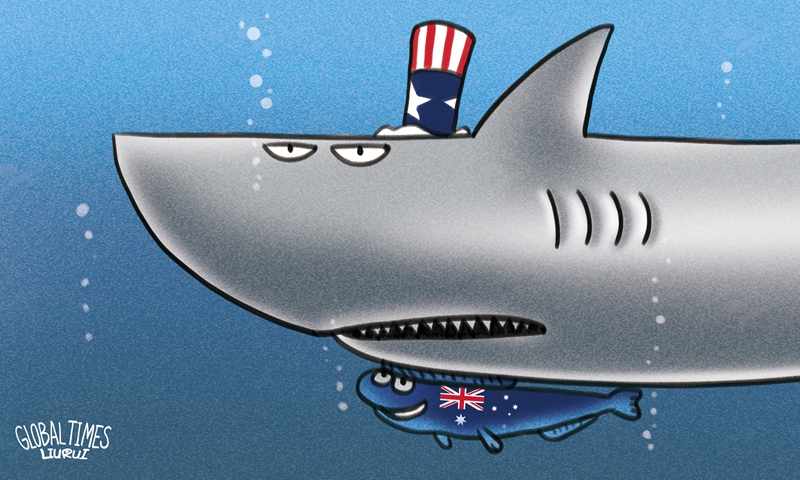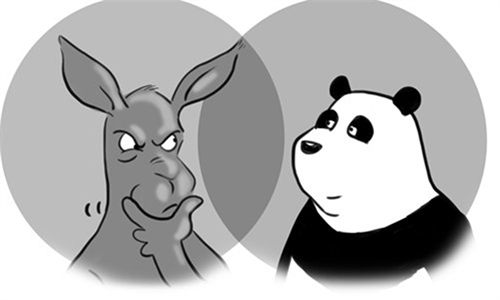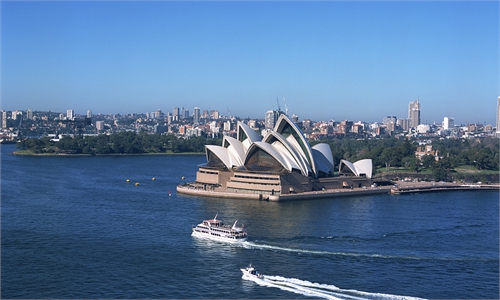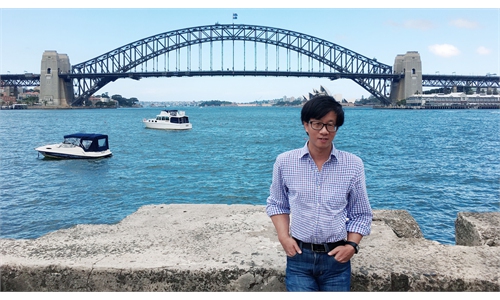
Illustration: Liu Rui/GT
Recent scandals involving Australian soldiers killing Afghan civilians and its diplomatic fallout have been a hot topic all over the world. But this has not stopped Australia's security services from carrying out more plotting and operations.
In a discussion about "Australia's defense agenda in a contested Indo-Pacific" at Australian National University earlier this month, Greg Moriarty, secretary of Australia's Department of Defence, talked about Australia's development and maintaining a cutting-edge military in the region. The official expressed his concerns about the "militarization of features in the South China Sea" and said it was "very legitimate for the Australian people and the security community to be concerned about elements" of how China asserted its interests in the region.
Australia has been increasingly aggressive in pointing a finger at China over the South China Sea issue in recent years. But it is easy to discover paradoxes in the developmental contexts of Australia's South China Sea policy.
First, when did the South China Sea become Australia's interest? As a non-claimant state, Australia barely mentioned the South China Sea in its official documents before the 21st century. However, the country's attention on the sea rose rapidly after the US launched the strategy of "the Rebalance to the Asia-Pacific," especially after the Tony Abbott government took office in 2013. In Australia's 2013 defense white paper, it stated that, "Australia has interests in the peaceful resolution of territorial and maritime disputes including in the South China Sea in accordance with international law." This argument has since been reinforced in a series of moves conducted by the US and its allies in the region.
Second, do Australia's South China Sea "concerns" really make sense? Australia said its main trade route goes through the South China Sea, therefore, stability and freedom of navigation in the region is important to Australia.
Canberra primarily doesn't accept China's "deterrence" or alleged "coercion" of small countries to change the status quo. However, it mentions nothing about the constant interference of the US and other Western countries in the South China Sea issue. Their meddling has internationalized and complicated regional affairs. These countries have become a biggest obstacle for the peaceful settlement of disputes and the promotion of regional stability.
Third, Australia's actual actions are far less forceful than its "shouting." Canberra has been running up to the anti-China frontline as a pawn of Washington in recent years - particularly over the South China Sea issue. However, its actions have been relatively "restrained." For example, rarely has Australia engaged in the "freedom of navigation operations" in the South China Sea alone, or with other countries.
This shows that the fundamental reason that Australia pays attention to the South China Sea issue is not because its direct interests are at stake. It is only because Australia is staying in line with the strategic shifts made by Washington in terms of defense and regional strategies. What worries Australia is not the ownership of South China Sea islands, nor the "rules and order" in the region. Australia's worries mainly come from its distrust in China. It doesn't believe that a peacefully rising China would show respect to small and medium-sized countries, including Australia, when dealing with relevant issues.
Moreover, Australia's strategic anxiety will further escalate as it hopes to maintain the US-dominated regional order and seek a place from it, meanwhile it cannot bear the consequences of excessively "provoking" China or even directly challenging China's core interests.
Australia will continue to strengthen its influence in regional security in the future. Canberra issued its 2020 Defence Strategic Update and 2020 Force Structure Plan in July regardless of the serious hit on its social and economic development amid the pandemic. The plan announced AU$270 billion in defense capability investment. Canberra also reached a reciprocal access agreement with Tokyo to scale up the two sides' military synergies.
As China-Australia relations hit a new low, senior government officials have toned down their rhetoric toward China for a while. But if Australia goes further in the South China Sea or with other military and security matters, it will be more difficult for Canberra to stop the downward spiral of bilateral relations with Beijing.
The author is a deputy director of South Pacific Research Study, Institute of Southeast Asian and Oceanian Studies, China Institute of Contemporary International Relations. opinion@globaltimes.com.cn



